Related Research Articles

Henry Graham Greene was an English writer and journalist regarded by many as one of the leading novelists of the 20th century.

Fury is a 1936 American crime film directed by Fritz Lang that tells the story of an innocent man who narrowly escapes being burned to death by a lynch mob and the revenge he then seeks. The film was released by Metro-Goldwyn-Mayer and stars Sylvia Sidney and Tracy, with a supporting cast featuring Walter Abel, Bruce Cabot, Edward Ellis and Walter Brennan. Loosely based on the events surrounding the Brooke Hart murder in San Jose, California, the film was adapted by Bartlett Cormack and Lang from the story "Mob Rule" by Norman Krasna. Fury was Lang's first American film.

Graham Greene is a First Nations (Oneida) actor who has worked on stage and in film and television productions in Canada, the United Kingdom, and the United States. He has achieved international fame for appearing in Kevin Costner's Dances with Wolves (1990), which earned him an Academy Award nomination. Other notable films include Thunderheart (1992), Maverick (1994), Die Hard with a Vengeance (1995), The Green Mile (1999), Skins (2002), Transamerica (2005), Casino Jack (2010), Winter's Tale (2014), The Shack (2017), Wind River (2017) and Shadow Wolves (2019).
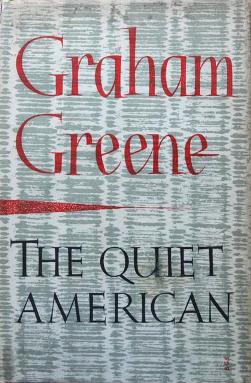
The Quiet American is a 1955 novel by English author Graham Greene.
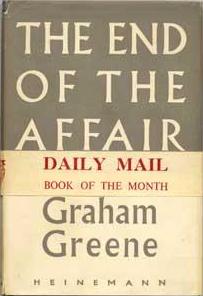
The End of the Affair is a 1951 novel by British author Graham Greene, as well as the title of two feature films that were adapted from the novel. Set in London during and just after the Second World War, the novel examines the obsessions, jealousy and discernments within the relationships between three central characters: writer Maurice Bendrix; Sarah Miles; and her husband, civil servant Henry Miles.

Sir Hugh Carleton Greene was a British television executive and journalist. He was director-general of the BBC from 1960 to 1969.
Blue movie or Blue film may refer to:

The Comedians (1966) is a novel by Graham Greene. Set in Haiti under the rule of François "Papa Doc" Duvalier and his secret police, the Tontons Macoutes, the novel explores political repression and terrorism through the figure of an English hotel owner, Brown.
"The Destructors" is a 1954 short story written by Graham Greene, first published in Picture Post and subsequently collected in Twenty-One Stories later that year.
"Alas, Poor Maling" is a short story by Graham Greene. It was first published in 1940.
Stamboul Train is the second significant novel by Graham Greene. Set on a train journey from Ostend to Istanbul, the book was renamed Orient Express when it was published in the United States. The novel appeared in 1932 and was Greene's first true success. It was taken on by the Book Society and in 1934 adapted as the film Orient Express.
Graham Greene (1904–1991) was an English novelist regarded by many as one of the greatest writers of the 20th century. Combining literary acclaim with widespread popularity, Greene acquired a reputation early in his lifetime as a major writer, both of serious Catholic novels, and of thrillers. He was shortlisted, in 1966 and 1967, for the Nobel Prize for Literature. He produced 26 novels, as well as several plays, autobiographies, and short stories.
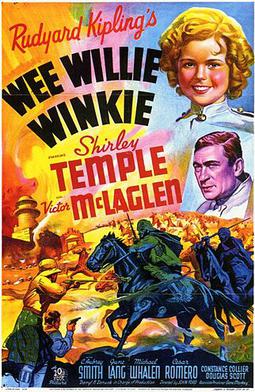
Wee Willie Winkie is a 1937 American adventure drama film directed by John Ford and starring Shirley Temple, Victor McLaglen, and Cesar Romero. The screenplay by Julien Josephson and Ernest Pascal was based on a story by Rudyard Kipling. The film's story concerns the British presence in 19th-century India. The production was filmed largely at the Iverson Movie Ranch in Chatsworth, California, where a number of elaborate sets were built for the film. This film was the first of three in which Shirley Temple and Cesar Romero appeared together: the second was Ali Baba Goes to Town (1937), and finally The Little Princess (1939).

Twenty-One Stories (1954) is a collection of short stories by Graham Greene. All but the last three stories appeared in his earlier 1947 collection Nineteen Stories
"The End of the Party" is a short story by the English writer Graham Greene (1904–1991). It was first published in 1929, and has been reprinted many times in anthologies. It is viewed as a classical expression of the English tradition of horror fiction, as it elicits a well-founded and increasingly intense sense of impending doom without inserting any scenes of physical violence.
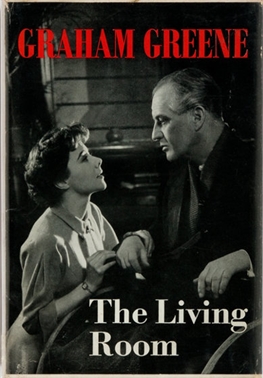
The Living Room is a 1953 play by Graham Greene

The Stranger's Hand is a 1954 British-Italian thriller drama film directed by Mario Soldati and starring Trevor Howard, Alida Valli and Richard Basehart. An international co-production, it is based on the draft novel with the same name written by Graham Greene. The plot follows the son of a British MI5 agent kidnapped in Venice by agents of Yugoslavia as he searches for his father.
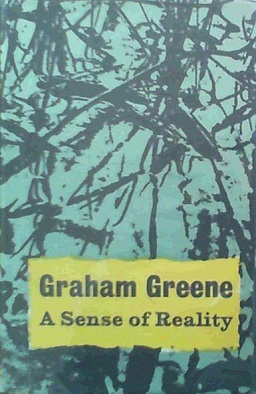
A Sense of Reality is a collection of short stories by Graham Greene, first published in 1963. The book is composed of three short stories and a novella, Under the Garden. These stories share a marked change of style from Greene's usual format, with the author plunging into fantasy, dreams, false memories and imagination.

May We Borrow Your Husband? and Other Comedies of the Sexual Life is a collection of short stories by British writer Graham Greene, first published in 1967. As the title suggests, this collection of twelve stories belongs to what Greene himself often described as entertainments. The stories are quite diverse, ranging as they do in gender, location and era and in genre, from farce to melodrama to tragedy and occasionally all of those genres at once.

The 1983 Nobel Prize in Literature was awarded to the British author William Golding (1911–1993) "for his novels which, with the perspicuity of realistic narrative art and the diversity and universality of myth, illuminate the human condition in the world of today".
References
- 1 2 Hill, Mike; Wise, Jon (2013). The Works of Graham Greene: A Reader's Bibliography and Guide. Bloomsbury Publishing. pp. 40, 178, 313. ISBN 9781441161949.
- ↑ Zinnes, Harriet (1963). "[Review of 21 Stories, by G. Greene]". Books Abroad. 37 (2): 206. doi:10.2307/40117752. JSTOR 40117752.